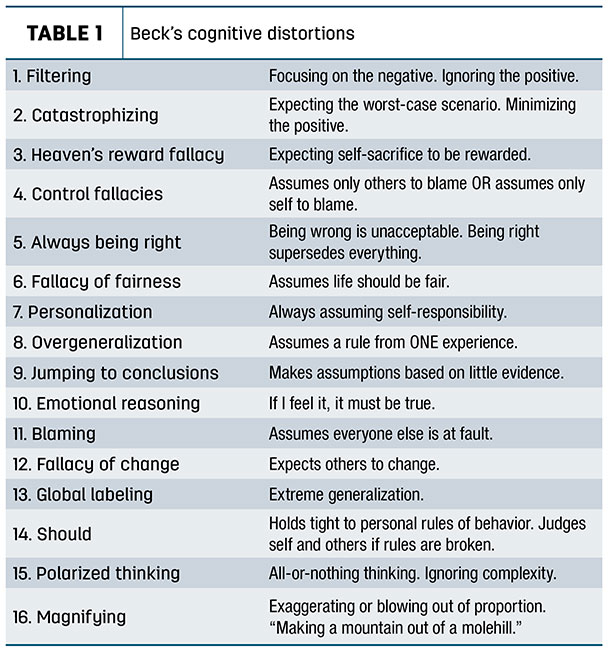What causes you to “foul up”? Cognitive distortions are habitual thought patterns that cause people to view reality in inaccurate – and usually negative – ways.
It’s the fancy way of saying your “knee-jerk reaction” to things and situations. When you’re experiencing a cognitive distortion, the way you interpret events is usually negatively biased.
The way we see things or react to things, although almost never recognized, plays a huge role in why farming partnerships fail or slowly come apart at the seams.
The following three scenarios are situations that came up in discussion during different mediation meetings I facilitated. As you read, try to determine what these three scenarios have in common. (Don’t worry if you can’t figure it out immediately. Read on and I’ll tell you later.)
- Joyce moved into the house on the main dairy and didn’t enjoy taking care of the flower beds as much as her mother-in-law had. She had three kids under 5 and was finding it difficult to juggle being herdsperson and raising kids. This really bothered her matriarch dairy mother-in-law to see her prize garden and a few other things go into disarray. It festered in her mind. It got to the point that her mother-in-law walked into her home unannounced one day and literally started slapping Joyce around, telling her she had to “pull up her socks” or else.
- There were two brothers who ran a small dairy with their dad. The older brother was an extreme perfectionist who could not allow a blade of grass to go uncut. One day, Billy went to put a round bale in the manger, but a cow was in the way so he put it in a different spot, which turned out to be awkward to get around during chores. His brother Gerald just ripped into Billy, calling him an “idiot” five times in the course of five minutes. The verbal spat led to both parties dishing out the silent treatment for a whole week.
- Joanne had a sister who was 17 years younger. This sister married Ed, the farmer next door who came to work full time on their family’s farm. Joanne had taught school and fed calves twice daily, always thinking she’d take over the farm one day. Her younger sister never had any interest in farming. Joanne grew distrustful of her brother-in-law’s intentions to “take it all over.” One night, Ed helped his father-in-law repair the milk cooler. He parked in the spot by the dairy where Dad usually parked. That night, Joanne was just about to feed the calves and was pulling a wagon of calf milk bottles when she saw her brother-in-law’s brand-new truck sitting in her dad’s normal parking spot. She lost it. She cursed and screamed, throwing the milk bottles against the truck in a rage.
All three scenarios are examples of someone “magnifying” a situation or “making a mountain out of a molehill.” Seeing the negative in everything or blowing things out of proportion most of the time can’t be seen as just a fleeting thought. For these farms, it was a bad habit that almost destroyed their farming partnerships.
Obviously, these are pretty extreme examples. However, I’ll tell you this straight up: All of the three farmers I’ve mentioned are the type of characters that, publicly, you would hold in the highest regard. They are straight shooters and amazing farmers. Nobody would ever expect these problems to happen on their farms. But we all react to situations from time to time in ways which aren’t rational.
Everyone experiences cognitive distortions from time to time. We have our own ways of reacting to situations which are self-destructive.
In the 1960s, psychiatrist Aaron Beck pioneered research on cognitive distortions and categorized them into 16 common distortions (see Table 1).

Everyone has at least one common cognitive distortion, if not many. What is yours?
The good news is: Cognitive distortions don’t have to weigh you down like an anchor. Thought patterns can be changed through a process referred to in cognitive therapy as cognitive restructuring. I know, I glazed over the fancy language at first, too. But the idea behind cognitive restructuring can be a game-changer. By adjusting our automatic thoughts, we are able to influence our emotions and behaviors.
In other words, we can train ourselves and rewire our brains to react to situations differently. Just like if our right hand was cut off and we had to rewire our brain to use our left. It is hard, but it can be done, and I’ve seen evidence of lives transformed as a result.
If you become self-aware that you tend to blow things out of proportion, you can start to ask yourself: “Is this that big of a deal?” The easiest way to solve this problem isn’t by spending thousands on Dr. Phil; it’s simply picking the right question to ask yourself every time you are struck with a “crisis.”
You can come up with your own questions to ask yourself, but here are a few examples:
- How do I know if this thought is accurate?
- What evidence do I have to support this thought or belief?
- How can I test my assumptions/beliefs to find out if they’re accurate?
- Do I have a trusted friend who I can check out these thoughts with?
- What would I say to a friend in this situation?
- Is this thought helpful in any way?
- Are there other ways I can think about this situation or myself?
- Am I blaming myself unnecessarily?
- What or who else contributed to this situation?
- Is it really in my control?
- Am I over-generalizing?
- Am I making assumptions?
- Can I look for “shades of gray”?
- Am I assuming the worst?
- Am I holding myself to an unreasonable or double standard?
- Are there exceptions to these absolutes (always, never)?
- Am I making this personal when it isn’t?
One simple question you can ask yourself can be the difference between a so-called crisis or just something to live and learn.
The question is: What is your cognitive distortion, and what questions will you ask yourself from now on?
I say “yourself,” but the truth is: You’re not farming alone. How does this apply to everyone on your farm?
Your partner might be the best human and best farmer alive. But most farmers aren’t ones to talk about psychology. Yet the way he or she reacts to things not only impacts your day but your life’s work and theirs.
Simply put, the easiest way to have this conversation is by not having this conversation.
Put this article on the kitchen fridge, highlight the key cognitive distortions that are your family traits and the counter-questions everyone can ask themselves. When you see each other reacting negatively, just remind each other in the moment that you are “magnifying the situation” (or whatever cognitive distortion your family shares) and, over six months, group accountability will change behavior.
Changing how everyone on your farm reacts to things can change everything.






